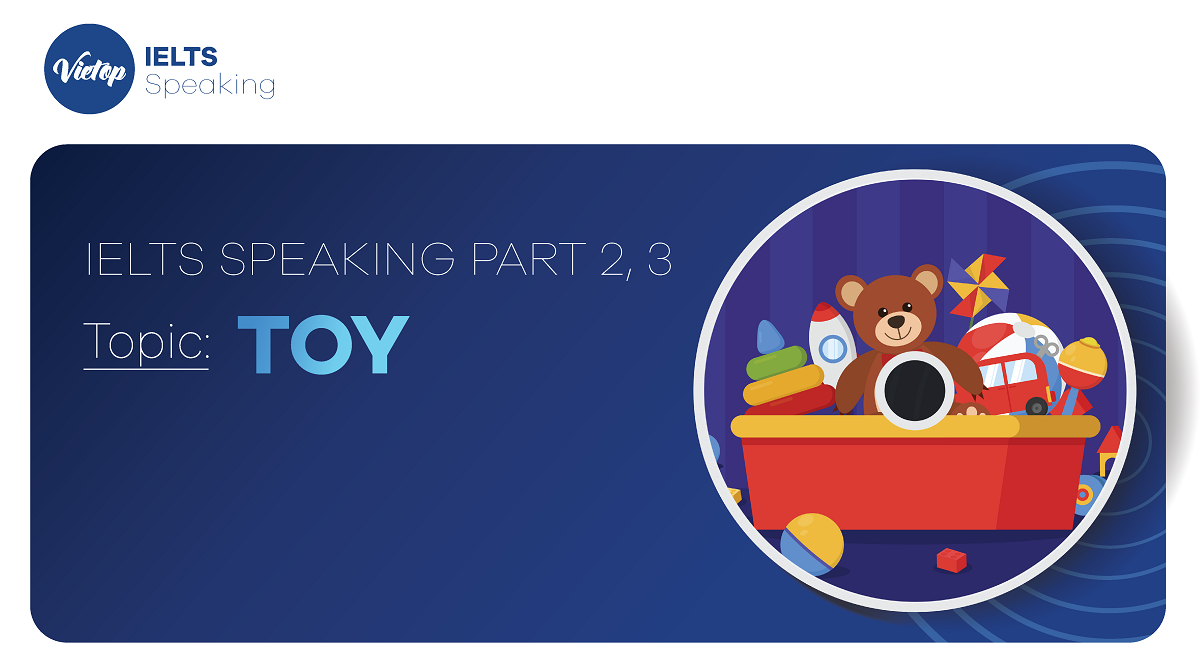Hôm nay, IELTS Vietop gửi đến các bạn bài mẫu topic Toys trong IELTS Speaking part 2, 3. Theo dõi ngay bên dưới để có một kỳ thi IELTS thật tốt nhé!
Bài mẫu topic Toys (Talk about toys) – IELTS Speaking part 1
Did you play with toys when you were a child?
Yes, I played with toys when I was a child. Like most kids, I had a variety of toys such as action figures, dolls, board games, and building blocks. Playing with these toys was a significant part of my childhood, and it allowed me to have fun, use my imagination, and learn through play.
Dịch:
Vâng, tôi đã chơi đồ chơi khi còn nhỏ. Giống như hầu hết trẻ em, tôi có nhiều loại đồ chơi như nhân vật hành động, búp bê, trò chơi board game và các khối xếp hình. Chơi với những món đồ chơi này là một phần quan trọng trong tuổi thơ của tôi và nó cho phép tôi vui chơi, sử dụng trí tưởng tượng và học hỏi thông qua vui chơi.
What kinds of toys did you like?
I enjoyed a range of toys during my childhood. Some of my favorites included action figures, remote-controlled cars, and building blocks like Lego. I also had a fondness for board games, particularly chess and Monopoly. These toys offered a mix of creativity, problem-solving, and entertainment, making them enjoyable for me.
Dịch:
Tôi rất thích nhiều loại đồ chơi trong thời thơ ấu của mình. Một số mục yêu thích của tôi bao gồm các nhân vật hành động, ô tô điều khiển từ xa và các khối xây dựng như Lego. Tôi cũng thích các trò chơi board game, đặc biệt là cờ vua và Monopoly. Những đồ chơi này mang đến sự kết hợp giữa tính sáng tạo, khả năng giải quyết vấn đề và tính giải trí, khiến chúng trở nên thú vị đối với tôi.
In your country, do boys and girls play with the same types of toys?
In my country, as in many others, there has been a traditional distinction between the types of toys that boys and girls are expected to play with. Historically, boys were encouraged to play with toys that promote physical activity, like cars, action figures, and sports equipment, while girls were often given dolls, kitchen sets, and more nurturing or domestic-themed toys.
However, these gender stereotypes have been evolving, and today there is a growing movement to encourage children to play with the toys they find interesting, regardless of their gender. Many parents and educators now strive to provide a more diverse and inclusive range of toys for all children to enjoy.
Dịch:
Ở nước tôi, cũng như ở nhiều nước khác, có truyền thống phân biệt giữa các loại đồ chơi mà bé trai và bé gái phải chơi. Trong lịch sử, các bé trai được khuyến khích chơi với những đồ chơi thúc đẩy hoạt động thể chất, như ô tô, nhân vật hành động và dụng cụ thể thao, trong khi các bé gái thường được tặng búp bê, bộ đồ chơi nhà bếp và nhiều đồ chơi nuôi dưỡng hoặc đồ chơi theo chủ đề gia đình.
Tuy nhiên, những định kiến về giới tính này ngày càng phát triển và ngày nay có một phong trào khuyến khích trẻ em chơi những đồ chơi mà chúng thấy thú vị, bất kể giới tính của chúng. Nhiều bậc cha mẹ và nhà giáo dục hiện đang cố gắng cung cấp nhiều loại đồ chơi đa dạng và toàn diện hơn cho tất cả trẻ em thưởng thức.
Do you think that toys help children to learn
Yes, I believe that toys can be valuable tools for children’s learning and development. Toys are more than just sources of entertainment; they offer numerous educational benefits. They stimulate a child’s imagination, promote problem-solving skills, encourage creativity, and facilitate social interaction when children play with others.
Educational toys, in particular, are designed to enhance cognitive and motor skills, teach basic concepts, and foster curiosity. Overall, toys play a crucial role in a child’s early learning and are often used by educators and parents to support a child’s cognitive and emotional growth.
Dịch:
Đúng, tôi tin rằng đồ chơi có thể là công cụ có giá trị cho việc học tập và phát triển của trẻ. Đồ chơi không chỉ là nguồn giải trí; họ cung cấp nhiều lợi ích giáo dục. Chúng kích thích trí tưởng tượng của trẻ, thúc đẩy kỹ năng giải quyết vấn đề, khuyến khích sự sáng tạo và tạo điều kiện thuận lợi cho sự tương tác xã hội khi trẻ chơi với người khác.
Đặc biệt, đồ chơi giáo dục được thiết kế để nâng cao kỹ năng nhận thức và vận động, dạy các khái niệm cơ bản và nuôi dưỡng trí tò mò. Nhìn chung, đồ chơi đóng một vai trò quan trọng trong quá trình học tập sớm của trẻ và thường được các nhà giáo dục và phụ huynh sử dụng để hỗ trợ sự phát triển nhận thức và cảm xúc của trẻ.

Nhận tư vấn miễn phí khóa học hè
Bài mẫu topic Toys – IELTS Speaking part 2

Đề bài: Describe a toy that you liked when you were a child
You should say:
- What the toy was
- Who gave it to you
- ow you used this toy
- And explain how you felt when you got this toy
Sample
I’m going to talk about the stuffed animal that I used to carry everywhere when I was younger. It was a stuffed “lion” which my aunty got me after seeing it at a market one day. I was about two years old and I’ve kept it for many years.
I was small, so the tiger seemed really big at the time but now it’s just as big as my fist. It’s made of some sort of cheap fabric and I can feel the roughness when I touch it. Its colours used to be bright orange but have since become dusty. It has a white mane which has been tattered and its tail is currently missing.
I remember that before my brother was born, I hadn’t had anyone to play with. Therefore, the toys, especially the ones that resembled animals, were “my friends” because I loved animals. This stuffed tiger certainly was my favorite. Though I’m now an adult, I still think of it fondly from time to time.
I plan to keep it for as long as I can. Maybe one day, when I have children of my own, I’ll show them the toy that their father played with. I hope that one day, I too can give a toy that they will cherish for much of their lives.
Tham khảo: Tổng hợp bài mẫu IELTS Speaking part 2
Vocab
- stuffed animal (adj + n): thú nhồi bông
- fist (n): nắm tay
- dusty (adj): bụi bặm
- tattered (adj): cũ kĩ và nhàu nát
- to resemble (v): trông giống
- fondly (n): một cách trìu mến
Bài mẫu Topic Toys – IELTS Speaking part 3
1. What toys are popular with boys and girls in your country now?
Opposite to when I was younger, entertainment for children now is much more digitized. So aside from the usual toys like cars and dolls, many children these days are hooked to tablets or smartphones to play games and watch videos. I’m sure that there are games and videos that target children based on their genders but I’m not knowledgeable enough to give specific examples.
- digitized (adj): số hóa
- specific (adj): cụ thể
2. Do you think advertising that targets children should be banned?
I’m tempted to say “yes” considering children don’t have the ability to pay for those products. Actually, I’ve read a study that shows advertisements that encourage children to nag and beg their parents are among the most effective advertisements. You’d be surprised how many people are willing to pay for something their child begs for simply because they want some peace. This way of advertising is manipulative and immoral and I’m leaning towards banning it.
Xem thêm: Khóa IELTS 1 kèm 1 – Chỉ 1 thầy và 1 trò, cam kết đầu ra
- be tempted (adj): rất muốn
- nag (v): mè nheo
- beg (v): xin
- manipulative (adj): thao túng (về mặt tâm lý)
- immoral (adj): thiếu đạo đức
- i’m leaning towards (nghĩa bóng) + opinion: tôi nghiên về ý này
3. Do you see the fact that children are targeted by many companies as potential consumers spoil their childhood?
I’m not sure about the quality of their childhood, but certainly, these companies are creating a generation of self-important and selfish kids who will be adolescents in a few years. We might think that they can grow out of it and be capable adults, yet usually childhood impacts last for a long time. They may grow up to be unreasonable people who do little and complain a lot. This is detrimental to society in the long run.
- self-important (adj): tự đề cao bản thân
- grow out of it : trưởng thành hơn (thoát khỏi tật xấu nào đó).
Topic Toys trong phần IELTS Speaking thật thú vị đúng không nào? Hy vọng với hai bài mẫu trên sẽ giúp ích được các bạn trong quá trình luyện thi IELTS. Và nếu bạn có thắc mắc gì về hai bài trên thì hãy để lại bình luận bên dưới nhé! Chúc bạn đạt được band điểm như mong muốn!











